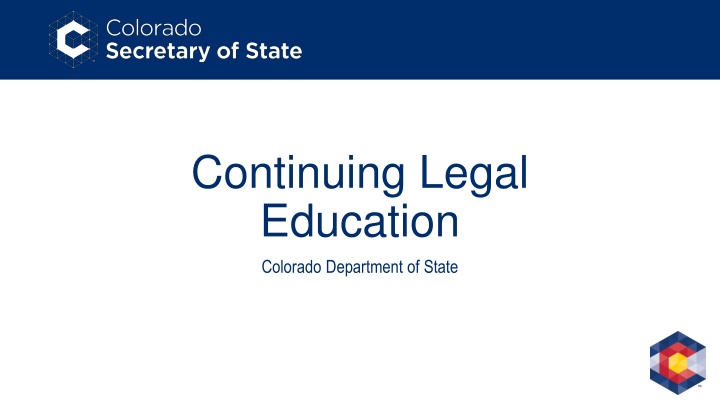
Public Data Fundamentals for Legal Education in Colorado
Discover the importance of public data in legal education with insights from the Colorado Department of State. Explore the value of data, the Business Intelligence Center, and the role of governmental agencies in managing data for public benefit.
Download Presentation

Please find below an Image/Link to download the presentation.
The content on the website is provided AS IS for your information and personal use only. It may not be sold, licensed, or shared on other websites without obtaining consent from the author. If you encounter any issues during the download, it is possible that the publisher has removed the file from their server.
You are allowed to download the files provided on this website for personal or commercial use, subject to the condition that they are used lawfully. All files are the property of their respective owners.
The content on the website is provided AS IS for your information and personal use only. It may not be sold, licensed, or shared on other websites without obtaining consent from the author.
E N D
Presentation Transcript
Continuing Legal Education Colorado Department of State
Public Data Fundamentals for Lawyers
Colin Whetsel OST Manager | Department of State 303.894.2200 x6261 colin.whetsel@coloradosos.gov
Disclaimer I am not a lawyer
Agenda Introduction Background Foundations of Public Data Current State of Public Data Helpful Tips & Resources Q&A
Business Intelligence Center (BIC) Created by HB16-1014 Adds C.R.S. 24-21-116 Program within the Business & Licensing Division The purpose of the program is to streamline access to public data and to provide resources to make the data more useful.
Business Intelligence Center Cont. C.R.S. 24-21-116 defines public data as data collected by a state agency or local government that is not required by law to be confidential
Does data have value? C.R.S. 24-21-116 (1)(a) The General Assembly hereby finds and declares that: (I) Public data is a valuable resource that can assist businesses with strategic planning and decision-making.
Philosophy & Data Data is valuable Governmental agencies are in possession of large amounts of data Governmental agencies are funded by the public Of the people, by the people, for the people
Reminder C.R.S. 24-21-116 defines public data as data collected by a state agency or local government that is not required by law to be confidential
Considerations Recognition of good data stewardship practices HB21-1236 added the publishing of an interdepartmental data framework and protocol (C.R.S. 24-37.5-703) Obligation and responsibility to protect PII Data relationships and possible triangulation
Decentralized Public Data Making public data available is a large effort. Each agency has largely pursued making data available independently Factors that contribute: System interoperability limitations Agency authority Lack of capability to publish
A shifting environment Increase in prevalence of centralized public data resources. California, New York, Colorado BIC assists Colorado agencies with identify and publishing data. Growing consideration of utility and accessibility of data.
Standards for open data Federal: The OPEN Government Data Act requires federal agencies to publish their information online as open data, using standardized, machine-readable data formats, with their metadata included in the Data.gov catalog. State of Colorado: The CIO must publish an interoperability data framework and protocol aimed at promoting data models across state agencies
Best practices for end users Extension of PII considerations and data ethics Public data is not limited to published data Data and dataset context Metadata Reporting interval
CLE Course ID 838827
Colin Whetsel OST Manager | Department of State 303.894.2200 x6261 colin.whetsel@coloradosos.gov Business & Licensing Division Business Intelligence Center bic@coloradosos.gov
